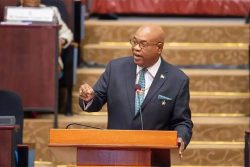Dear Editor,
Recently, I read your article on the transfer of government owned vehicles by public servants who had insider information and access to mechanisms that would have allowed the unauthorized transfer of national assets owned by the people of Guyana to private persons. If this allegation is confirmed, this will be a clear case of corruption, the embezzlement of public assets for private gain at the expense of taxpayers.
Several matters intrigued me about this act. First, my attention was drawn to the contents of the receipts issued showing that money was paid for the vehicles. However, those receipts did not comport with what I recall as authentic government issued receipts. When I was employed in the Public Service, I recall that every receipt issued by any ministry had a unique number for each receipt; and that every receipt book had several receipts that were sequentially listed. For example, if the receipt book had 50 receipts and the first receipt was numbered 200045, the next was 200046 and the last receipt in the book was numbered 200049. At the top of each receipt, which was prepared at least in duplicate, had the identification, ‘The Government of Guyana’. What was striking about the receipts were the hand-written titles ‘PSM’ at the top of the receipts and there were no receipt numbers on the receipts.
Editor, if this is indeed the way government receipts and payments are being managed, it is clear that one cannot account for all the receipts issued by that government department, and therefore the government accounting system has degenerated into a sorry state being ripe for corrupt acts. Under this deficient accounting system, tracing funds received and accounting for all receipts issued would not be possible, especially when pages are removed in fraudulent activity. I hope the Auditor General is moving on this immediately, for he does not have to obtain permission from anyone in government or elsewhere to investigate this malfeasance. The Guyana Constitution has carved out this authority for his investigation of all government accounts. His failure to do so would be a dereliction of duty. Alternatively should he engage in this matter his action will present useful information for the police investigation.
A second area of concern was the procedure used to transfer the cars identified. My recall is that the disposal of government assets must be done by public auction, where the public is given an opportunity to bid on each item in a fair and transparent process. This approach begins with a valuation of the assets before the auction, setting a minimum price for the item and thereafter the bidding takes place by way of people bidding for the asset. If this was not done, these assets must be reclaimed by government because the process was not fair and transparent. The fact that the prices recorded on the receipts seem low, it could mean the new owners would have received a government asset that had a market value that is relatively higher than the price they paid and therefore on their resale of the asset they would have made significant profits.
The third matter is the nexus that can be drawn between the vehicle transfer and the ‘sale’ of government lands by persons who may have secured ownership of those lands for relatively cheap prices and then in turn resold the land at market prices, making significant profits for doing nothing. A public auction of the asset would have cleared this up. It would be interesting to report how many house lots and lands were ‘sold’ under this deformed process. Another case is the matter of the transfer pricing observed in the ‘sale’ of wamara logs as reported by Dr Janette Bulkan. Undoubtedly, when these activities are taken together, land sales, wamara log exports and vehicles, it shows glaring cases of corruption. The solution here is simple: follow the money and the paper trail wherever it leads. Enforce the law. Improve the accounting and auction system, which is the complementary side of the procurement system. Taxpayers will be happy when these steps are taken.
Your faithfully,
C Kenrick Hunte








